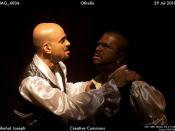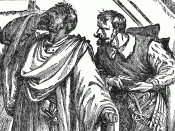The latter half of Act 3 Scene 3 contains, what some may consider, the climax of the play, as Iago completes his manipulation of Othello and decides that he must now let nature run its course. The scene depicts OthelloÃÂs declining mental condition as IagoÃÂs supposed evidence, which in some parts has descended to complete lies, begins to take its effect on the once great general.
The latter part of Act 3 Scene 3 is the climax of the play. It is here where Iago finally convinces Othello of his wifeÃÂs dishonesty with Cassio and after which IagoÃÂs just needs to let nature run its course. This is shown by the large amounts of natural imagery used by Iago, particularly when Othello is present. This is made clear when Othello enters for the final time in the scene. Immediately before Othello enters, Iago is using his by now almost trademark imagery of poison, hell and deathÃÂ ÃÂburn like the mines of sulphurÃÂ.
However, as soon as Othello reappears, IagoÃÂs language turns to talk of nature and flowers, in particular those with sleep-inducing qualities. This shows how Iago and his cunning nature know that he does not yet have the complete trust of Othello and has yet to convince him of DesdemonaÃÂs affair with Cassio. The use of this natural imagery also shows how Iago has now planted the seeds of jealousy in OthelloÃÂs mind and must now let nature run its course.
A little later in the scene, Othello begins to say goodbye to his life in the military to concentrate on maintaining his marriage to Desdemona. In speech, Othello uses the word ÃÂfarewellÃÂ as an anaphora, giving the speech melodramatic feel. This speech can be seen as being incredibly selfish, with Othello focussing solely on his own military career and appearing to be very nostalgic about the subject. It can also be seen as a major indication that Iago has begun to be been won over by IagoÃÂs argument. However, it is clear that he has yet to be completely convinced, saying: ÃÂVillain, be sure thou prove my love a whoreÃÂ (line 360).
On line 361, Othello asks that Iago provide him with ÃÂocular proofÃÂ of his wifeÃÂs affair. This contrasts with many of OthelloÃÂs decision later in the scene. For example he is later convinced of the affair by IagoÃÂs story of the handkerchief and promotes Iago to lieutenant after a similar story. This not only shows IagoÃÂs manipulative nature, but also how easy he finds it to manipulate Othello.
The audience then gets the impression that Othello is once again on the front foot, as he begins to question IagoÃÂs accusations against Desdemona. This receives an incredibly melodramatic portrayal of his own innocence by Iago, mainly aided by the heavy use of apostrophication. Iago then goes on to present his view of honesty, ÃÂhonestyÃÂs a foolÃÂ (line 383), a contrasting view to his ideas on reputation and honesty earlier in the play.
Towards the end of the scene, it is clear that Iago has completely convinced Othello of his wifeÃÂs adultery, leading to a reversal of roles, whereby Iago is no longer servant to Othello, but is instead his master. Despite this, Iago still wants it to appear to Othello that the old arrangement is still in place, asking for OthelloÃÂs guidance when looking for proof of the affair: ÃÂWhat then? How then? What shall I say?ÃÂ (lines 401-2). He also sees it necessary to continue to test Othello, dismissing the evidence that he presents: ÃÂ Nay this was but his dreamÃÂ (line 428), suggesting that he is not yet certain to what extent he has manipulated Othello.
A little later in the scene, and the manipulation is complete. this is shown by Othello taking on the language of Iago, now to a significant extent. For example, he talks of slavery (ÃÂO that the slave had forty thousand lives!ÃÂ) and including some satanic and dark imagery for good measure: ÃÂArise, black vengeance, from thy hollow cell!ÃÂ (line 448). This could also be a reference to race and the racial prejudices that he received from DesdemonaÃÂs father, Brabantio, earlier in the play. Another way in which the completion of the manipulation is also shown by the use of stichomythia, whereby Iago finishes off OthelloÃÂs lines, such as lines 440-1. Othello then goes to talk about the Pontic Sea and the Dardanelles, where the current only flows one way. This shows how the passion is only flowing one way in his relationship with Desdemona. The scene reaches its climax with both Othello and Iago kneeling on the floor. This is meant to represent a marriage of sorts, showing how Iago has convinced Othello of DesdemonaÃÂs adultery and that he [Iago] and Othello are now united so Othello can be manipulated almost at will. This is mainly shown by the way the two characters kneel separately, but rise together. OthelloÃÂs final line in the scene gives Iago the position of lieutenant, initially leaving the audience slightly confused after Othello gave up his military career earlier in the scene. This now means that, although he has now achieved his original aim, IagoÃÂs hatred for Othello is now much deeper, giving the impression that Iago grudge has in fact been without much reason from the outset of the play. On the other hand, it could be considered that Iago has simply lost all perspective of his dislike for Othello and, particularly in the last scene, it has spiralled wildly out of control.
The latter half of this scene confirms the destination of the play, as the highly manipulative Iago seals his reputation as the villain of the play as Othello is wildly led astray. Scene 3 of Act 3 leaves the audience feeling throughout that ÃÂif only another character had entered the fray, dashing IagoÃÂs evidence,àbut, alas it was not to be as Othello, who can often be seen as naïve due to his almost blind acceptance of IagoÃÂs rather flimsy evidence, is led to the point of delusion and hysteria as he vows to kill his wife and orders his new lieutenant to murder his ÃÂgood friend, Cassio.ÃÂOthello - Cambridge University Press (2001)Shakespearean Tragedy - A.C. Bradley (1904)Diabolic Intellect And The Noble Hero - F.R. Leavis (1952)
![From the Library of Congress: TITLE: Thos. W. Keene. Othello CALL NUMBER: POS - TH - 1884 .O7, no. 1 (C size) [P&P] REPRODUCTION NUMBER: LC-USZC6-58 (color film copy transparency) RIGHTS INFORMATION: No known restrictions on publication. MEDIUM: 1 print (](https://s.writework.com/uploads/9/94760/library-congress-title-thos-w-keene-othello-call-number-pos-thumb.jpg)




